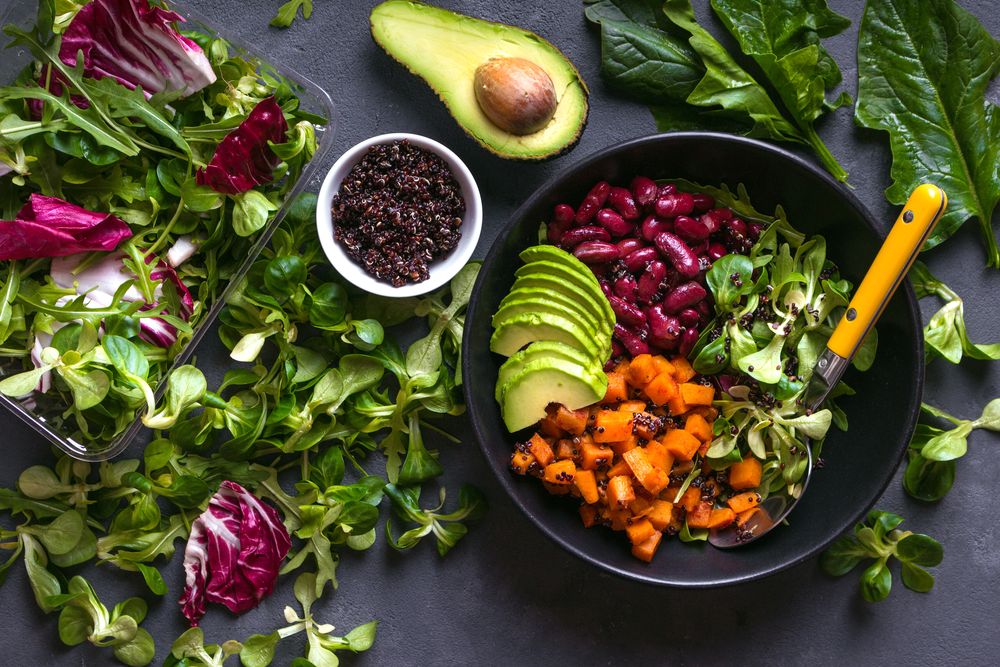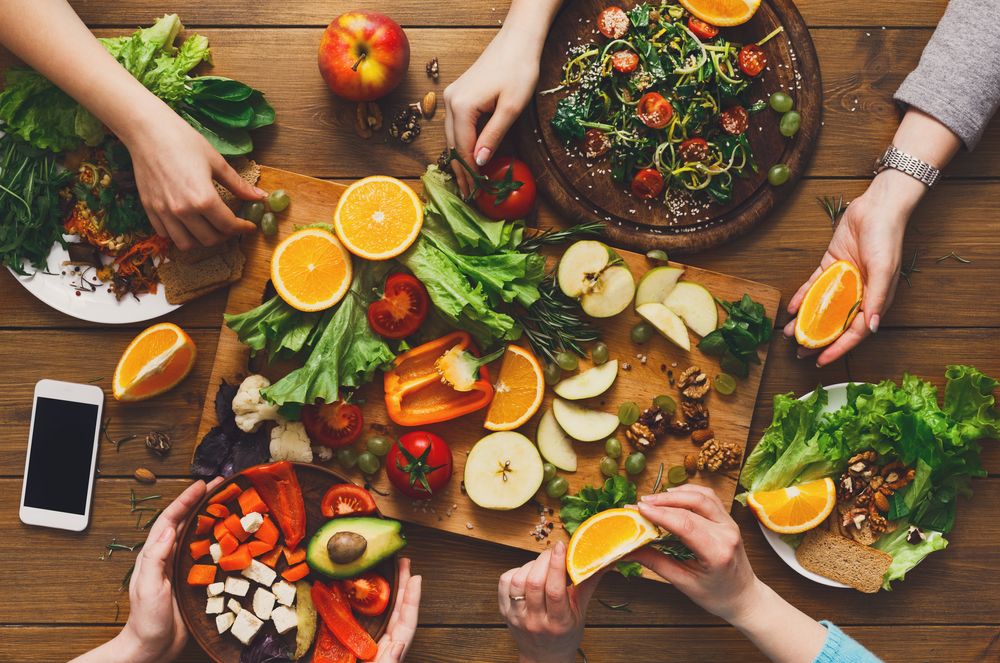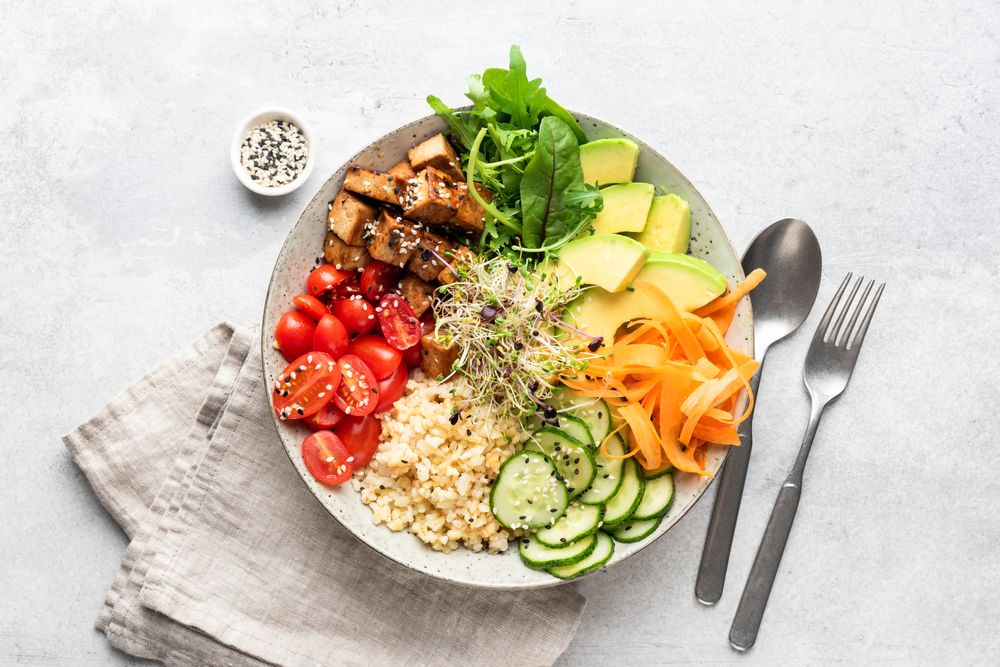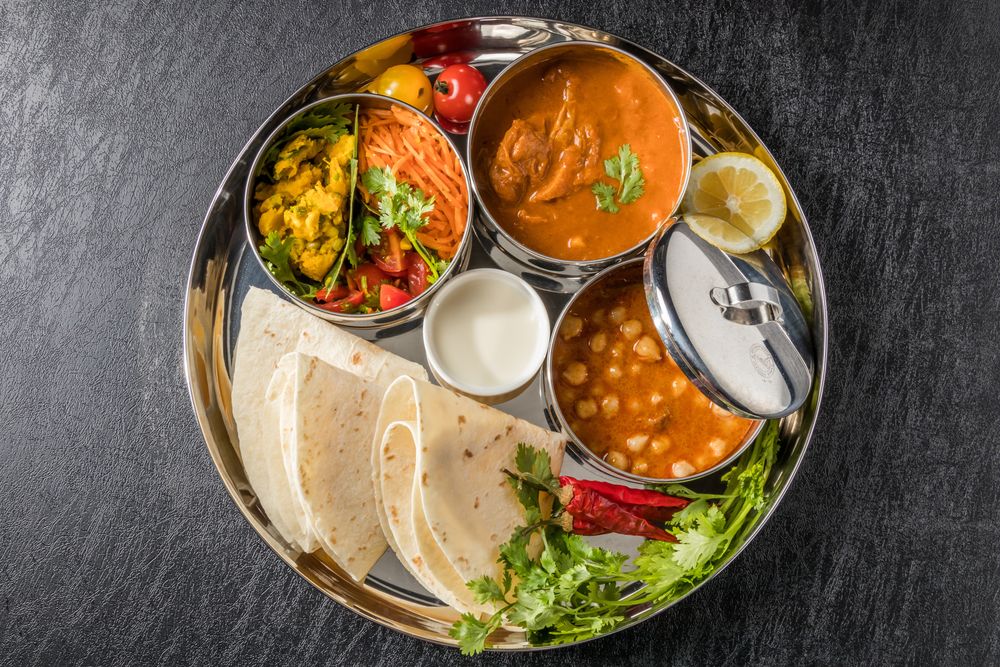Vegetarianism is not only a function of one’s cultural and social legacy but a mass movement that has gained immense popularity recently. It is a movement that has gained momentum.
Vegetarian diets are popular for a variety of reasons. A vegetarian diet is a way of life or a lifestyle choice. An increase in vegetarianism results from supporting causes like no animal cruelty, less environmental damage, prevention of ecological balance.
For some, the reasons are entirely personal, like health, following a sattvic diet, connection with healing practices like Yoga. Some are born vegetarians, and it is a religious or cultural legacy.
A well-planned vegetarian diet is completely balanced. This eating pattern excludes all meat and its by-products. In some cultures, vegetarianism may mean the inclusion of eggs in diets.
Fresh fruits, vegetables, cereals, legumes, nuts, and seeds are integral to a vegetarian diet. A well-balanced vegetarian diet can help you stay fit and lose weight or maintain optimum weight. It can fulfil all your nutritional requirements.
A well-balanced plant-based diet often contains less saturated fat (SFAs), more folate, fibre and antioxidants. Also, vegetarians are naturally inclined to have a higher intake of fruit and vegetables, which can help meet the recommended daily allowances of micronutrients.
Types of Vegetarian Diet for Weight Loss
Vegetarian diets come in various forms, enabling you to eat in a way that best suits your health goals.
1. Vegan Diet
A vegan diet is one that does not include meat, fish, dairy and eggs. Veganism is a social movement that considers animal welfare, fewer injectables like hormones and milk enhancers in livestock, ethical fashion and beauty. A vegan diet consists entirely of plant foods.
Fruits, vegetables, grains, nuts, seeds, and legumes such as beans, peas, and lentils are part of a vegan diet plan. In addition, healthcare professionals may advise vegans to take vitamin and mineral supplements such as vitamin B12, iron, omega-3 fats, zinc, etc. However, primarily it is because vegan diets can sometimes be deficient in the mentioned nutrients.
Read More: Best Vegan Diet Plan to Control Diabetes
2. Ovo-vegetarian Diet
An ovo-vegetarian diet excludes dairy products but includes eggs; as signified from the prefix ‘ovo’. This diet eliminates all dairy products and dairy product derivatives. Like, cow’s milk, cheese, butter, sour cream, yoghurt, and ice cream, in addition to meat and fish. On the other hand, meals include eggs and egg items such as scrambled eggs, hard-boiled eggs, and omelettes.
3. Lacto-vegetarian Diet
Plant-based foods and dairy items such as milk, cheese, yoghurt, and ice cream are part of a Lacto-vegetarian diet. While eggs, meat, and fish are not.
As the “Lacto” word indicates, it is a diet that incorporates dairy products. This diet type is the most popular form of vegetarianism.
Dairy items, such as cow’s milk/buffalo milk and foodstuffs prepared with it, fall into this category. Cheese, butter, buttermilk, yoghurt, curd, paneer and ice cream are a few examples of these.
4. Lacto-ovo-vegetarian Diet
A lacto-ovo-vegetarian diet consists of eggs and dairy products. It does not include meat or seafood.
Meal plans include eggs, milk, cheese, buttermilk, yoghurt, paneer, and other dairy items. At the same time, it does not contain any animal-derived flesh products such as cattle, fish, poultry, and pork.
Is it better to be on a vegetarian diet?
Vegetarian diets have both advantages and drawbacks. But first, you must understand how it can affect your health.
Pros of a Vegetarian Diet
1. Good for cardiac health
Vegetarian diets tend to be lower in fat. In addition, they can be low in saturated fat and high in dietary fibre. Moreover, they tend to include more whole grains, legumes, nuts, and soy protein with beneficial outcomes. In addition, the absence of red meat, cold cuts and staying away from packaged food, natural plant-based food can help prevent and treat chronic health issues like cardiovascular disease (Heart-disease).
Vegetarian food contains a comparatively better antioxidant profile, protecting one from heart diseases.
2. Protects From Cancer
As per one study, certain plant foods like fruits and vegetables promote weight loss and decrease cancer incidence. In addition, some studies show that a vegan diet may result in a reduced incidence of general cancer, especially in women.
Lacto-ovo vegetarian diets offer protection against gastrointestinal malignancies as well.
Being vegan isn’t easy as it limits one’s options to an extent. However, a well planned plant-based diet rich in fruits and vegetables can benefit.
3. Lowers Blood Pressure
Vegetarian diets may result in decreased blood pressure. Therefore, these diets might be a practical non-pharmacologic approach for naturally lowering blood pressure.
A vegetarian gets adequate potassium from fruits and vegetables. Potassium is known to protect from hypertension. However, a proper diet plan by a professional may achieve the right result.
4. Improved Weight Management
Vegetarian diets may aid in weight loss. Studies have shown that vegetarians lost much more weight than their non-vegetarian counterparts. Significant weight loss was seen in participants following a vegan diet and, to a lesser extent, in those following a lacto-ovo-vegetarian diet.
Observational studies also reveal that vegetarians’ weight and BMI are between 3% and 20% lower than non-vegetarians.
Cons of a Vegetarian diet
1. Consuming Too Many Carbs
Vegetarian diets that lack the right amount of protein and fibre may result in high carbohydrate intake. Since a vegetarian diet comprises plant-based foods, a high grain-to-veggie ratio is quite common. Consequently, this can make you put on weight rather than lose it. Therefore, it is crucial to add fresh fruits and vegetables to your everyday diet.
A well-balanced vegetarian diet should include plenty of vegetables and fruits, along with legumes, grains, and nuts. So, it helps to download an app like HealthifyMe. It helps calculate your daily calorie intake and assess the right amount of macro and micronutrients.
2. Possible Nutritional Inadequacy
Some essential nutrients in animal foods may be missing in a plant-based diet. For example, while some vegetarian diets may have a substantially reduced risk of major chronic diseases, particular minerals, such as zinc, may be missing in vegetarian diets.
Vegetarians may be at risk of zinc insufficiency because plant sources of zinc include phytate and other zinc absorption inhibitors.
Another such micronutrient is Vitamin B12. Unfortunately, due to inadequate intake of the right food, a vegetarian diet may be deficient in vitamin B12. Therefore, it is advisable to include a range of nutritious foods and supplements in an individual meal plan.
3. Exposure to Chemicals
There could be a possibility of increased risk of exposure to herbicides and pesticides. Indeed, it can be because fruits, vegetables, and grains are more at risk of exposure to these chemicals. Thus, vegetarians may get chemical and pesticide-induced food poisoning.
Vegetarian Diet Tips for Weight Loss
Fruits, vegetables, whole grains, legumes, nuts, and seeds are part of an ideal daily meal plan. These foods are high in fibre, micronutrients, and natural bioactive components. While attempting to lose weight, one needs to know how much is suitable for the specific body type, based on age and other factors. It is always advisable to speak to a nutritionist about the right portion size and food groups to include.
1. Pay Attention to the Type of Carbs on Your Plate
Foods high in refined carbohydrates, such as bread and bakery products, are high in calories. In some cases, one cannot avoid them for lack of available options. The idea is not to stop them. But have them in moderation.
Refined carbohydrates lack fibre and do not fill you up as much as whole-grain, complex carbohydrates do. As a result, you may end up consuming more calories.
On the other hand, consuming more complex carbohydrates is better. These are comparatively higher in fibre content and can also provide you with good micros. Complex carb sources fruits, veggies, nuts, whole grains, beans and millets.
2. Portion Size
Consuming more calories than you burn contributes to weight gain.
Even if you’re eating nutritious meals, you may be eating more than your body requires. It is hence essential to control your portion size.
3. Overlooking Protein
A typical vegetarian meal plan may lack protein. When you are trying to lose some extra kgs, you must get adequate protein daily.
Protein can promote satiety by reducing ghrelin levels, a hormone that helps regulate appetite. Subsequently, this will lead to a reduction in overall calorie consumption and weight loss.
You can include protein-rich foods to ensure you meet your daily requirement. For example, beans such as rajma, channa, chole can be eaten as snacks or along with meals. Nuts and milk are also good protein sources and can up your daily protein intake.
You can make yourself multigrain atta instead of plain wheat-atta with millet blend. As a result, not only does the protein content in your atta increase, but you also get additional micronutrients, such as iron and calcium. In addition, soy products, mushrooms, and germinated sprouts are great ways to add protein to your diet.
Foods to Help You Lose Weight on a Vegetarian Diet
The objective of getting the most out of your diet is to be aware of your nutritional requirements. Assess your health goals to plan your meals.
Therefore, the benefits of vegetarianism are primarily dependent on the type of foods you eat and your daily dietary patterns. It thus becomes essential to know the types of foods to include and the right portions.
Vegetarian Foods that Boost Weight Loss:
- High-fibre vegetables: Filling half your plate with veggies rich in fibre, such as green leafy vegetables, broccoli, cauliflower, and mushrooms, can help you stay full. This simple rule helps lower your calorie consumption.
- Complex carbohydrates: Foods like whole grains, starchy vegetables, fruits, nuts, pulses and beans are examples of complex carbs. These help you feel satiated and are reasonably high in fibre, aiding in weight loss.
- Vegetarian protein: Load up on beans, millets, milk and milk products and eggs. It helps get the adequate amount of protein your body requires to speed-up weight loss.
- Watery fruits and veggies: Citrus fruits, melons, squash, cucumbers and pumpkins, all contain high water content. These make you feel full for a longer time. In addition, they can be good snack options as they are low in calories and curb hunger. Therefore if you are looking at weight loss, add these to your vegetarian diet.
- Nuts and seeds: Nuts like almonds, walnuts, pistachios, and seeds such as sunflower or melon seeds, flax seeds and basil seeds make great snack options. They contain protein and healthy fats, which help in weight loss. But make sure to control your portion with these as they are also calorie-dense.
Foods to Avoid:
- Refined food: Avoid food items made with maida or other refined grains. They are calorie-dense with little to no nutritional benefits.
- Highly processed foods: Bakery products, packed foods and beverages, papads, and pickles are some examples of highly processed food items. These contain added sodium and sugar. As a result, they are highly refined and increase calorie intake, leading to unwanted weight gain.
- Pickled, frozen and canned foods: Homemade or store-bought foods that are pickled are typically high in sodium. Likewise, store-bought frozen and canned foods (like canned/ frozen fruits and nuts) contain a lot of preservatives and added sugars. Avoid these food items as they lead to weight gain.
7 Day Sample Vegetarian Diet Plan Chart for Weight Loss
To lose weight on a vegetarian diet, you must include a range of wholesome plant-based foods. Add whole fruits and vegetables, beans and pulses, whole grains and nuts to get the most benefits from your vegetarian diet.
Alongside, limit your intake of less nutritious options, such as sugar-sweetened beverages and refined carbohydrates.
Our meal plan list for a week of healthy, balanced vegetarian foods will assist you in your journey to achieve your health goals.
Veg Diet Plan – Day 1
Breakfast: Oats porridge with nut mix (1 bowl)
Lunch: Roti (1) with dal and gajar-matar sabzi/ paneer sabzi (1 katori)
Dinner: Roti (1) with dal-lauki sabzi (1 katori)
Snacks: Cucumber detox water (1 glass)/ Choice of seasonal fruit (1)/ buttermilk (1 glass)/ tea (1 cup)/ detox water (1glass)
Veg Diet Plan – Day 2
Breakfast: Mixed veg. Roti (2 pc) with curd (1 Katori)
Lunch: Lentil curry (1 Katori) with methi rice (½ Katori)
Dinner: Sautéed vegetables with paneer (1 Katori) with roti (1) and green chutney (2 tbsp)
Snacks: Cucumber detox water (1 glass) Skimmed Paneer (100gm)/ choice of 2 seasonal fruits/buttermilk (1 glass)/ coffee with less sugar and milk (½ cup)
Veg Diet Plan – Day 3
Breakfast: 1 glass buttermilk + 1 tsp Chia seeds with Multigrain Toast + 2 Tbsp of chickpeas Hummus
Lunch: Sautéed vegetables with paneer (1 Katori) with roti (1) and green chutney (2 tbsp)
Dinner: Lentil curry (1 bowl) with methi rice (½ bowl)
Snacks: Cucumber detox water (1 glass) Skimmed Paneer (100gm)/mix vegetable salad (1 bowl)/banana (1)/ buttermilk (1 glass)/ coffee with less sugar and milk (½ cup)
Veg Diet Plan – Day 4
Breakfast: Fruits and nuts yoghurt smoothie (0.75 glass) and besan/ egg omelette (1 serve; 1 egg)
Lunch: Whole green gram dal cooked (1 bowl) with Bhindi sabzi (1 bowl) and roti (1)
Dinner: Palak chole (1 bowl) with steamed rice (½ bowl)
Snacks: Cucumber detox water (1 glass)/ orange (1)/ buttermilk (1 glass)/ Mix vegetable salad (1 katori)/ skimmed milk paneer (100gm)
Veg Diet Plan – Day 5
Breakfast: Skimmed milk (1 glass) with peas Poha (½ bowl)
Lunch: Low-fat paneer curry (1.5 bowls) with Missi roti (1)
Dinner: Curd (1.5 bowl) with Aloo Baingan Tomato Sabzi (1 katori)
Snacks: Cucumber detox water (1 glass)/ Skimmed milk paneer (100gm)/ Mixed vegetable salad (1 bowl)/ Tea with less sugar and milk (1 cup)
Veg Diet Plan – Day 6
Breakfast: Mixed sambar (1 bowl) and idli (2pc)
Lunch: Curd (1.5 bowls) with Aloo Baingan Tomato Sabzi (1 bowl)
Dinner: Whole green gram dal cooked (1 bowl) with Bhindi sabzi (1 bowl) and roti (1)
Snacks: Cucumber detox water (1 glass)/ Skimmed milk paneer (100gm)/ Mixed vegetable salad (1 bowl)/ coffee with less sugar and milk (½ cup)
Veg Diet Plan – Day 7
Breakfast: Besan chilla (2 chillas) with Green Garlic Chutney (3 tbsp)
Lunch: Palak Chole (1 bowl) with Steamed Rice (½ bowl)
Dinner: Low-fat paneer curry (1.5 bowls) with Missi roti (1)
Snacks: Cucumber detox water (1 glass)/ Skimmed milk paneer (100gm)/ Mixed vegetable salad (1 bowl)/ Apple (1)/ Buttermilk (1 glass)
Conclusion
A vegetarian diet is predominantly plant-based. It may not permit the consumption of certain animal-derived foods. The ideal diet for you results from your nutritional and health goals and the diet’s compatibility with your lifestyle.
The benefits of vegetarianism, meanwhile, are primarily dependent on the types of foods you eat and your general eating practices.
Overconsumption or eating highly processed food in excess will have fewer benefits and negative consequences. Weight gain is one of them. On the other hand, choosing from a range of food items and eating the right food in the right amount will aid you in healthy weight loss.
Vegetarians can derive multiple health benefits by eating their meals the right way. Be inclusive in your food choices and try vegetarian food products and dishes from different regions. Experimenting with your vegetarian palette will not only give you the adequate amount of nutrients required daily but will also help you enjoy your weight loss journey.
More content from Weight Loss
– 20 Proven Weight Loss Tips for Healthy Lifestyle
– 7 Day GM Diet Plan for Weight Loss
– Can Glucose Data Aid Behaviour Change and Weight Loss?
– How Can Glucose Tracking Complement Our Weight Loss?
– 7 Best Weight Loss Meal Plans for Men
– Weight Loss Tips with Foods for Thyroid
– Spices to Boost Your Weight Loss Journey
– Ways to Decide on A Diabetes Meal Plan for Weight Loss
Frequently Asked Questions (FAQs)
Q. Is it healthier to be a vegetarian?
A. A vegetarian diet devoid of red meats contains less cholesterol. It mainly revolves around fruits, veggies, and whole grains, the risk of various diseases may be reduced. As a result, the proper vegetarian diet may be a healthier option in some cases.
Q. Can you lose weight by eating vegetarian?
A. Yes, you can lose weight by eating a vegetarian diet. Eating fruits, vegetables, nuts, whole grains, and pulses is ideal. If you eat the right foods in the right portion size and keep it within your calorie limit, weight loss is possible on a vegetarian diet.
Q. How do vegetarians lose weight fast?
A. A vegetarian diet is rich in healthy grains, fruits and vegetables, nuts, and seeds that satiate you naturally. It makes you feel fuller after eating and encourages you to consume fewer calories (if you keep a check on simple carbs).
Q. What can a vegetarian eat to lose belly fat?
A. To lose belly fat, you must keep within your calorie limit. Eating vegetarian foods high in fibre and protein will make you feel fuller and help you lose fat. You can do this by adding more fruits and raw veggies to your diet. Eat great green leafy veggies, watery fruits, chickpeas and millets. Don’t forget to stay within the portion size!
Q. What is the 7 Day Challenge Diet?
A. A 7 Day Challenge Diet is where people eat a different food category or a mix of food groups every day. Fruits, vegetables, meat (replaced by paneer/ tofu for vegetarians), and milk are critical items this diet permits. It is also known as the GM diet, and it restricts the foods that people can eat. As per the regimen, people should have a hearty breakfast, a modestly sized lunch, and a small dinner. It also permits snacks throughout the day.
Q. What are the advantages of being a vegetarian?
A. A vegetarian diet offers numerous benefits. Vegetarian diets provide many nutritional advantages, including reduced saturated fat (SFAs), cholesterol, and animal protein. But, on the other hand, it offers more significant levels of dietary fibre, magnesium, potassium, folate, and antioxidants like vitamins C and E, as well as phytochemicals. That prevents various lifestyle diseases and may improve longevity.
Q. What is the negative effect of being a vegetarian?
A. Exposure to highly refined, processed foods like maida and packaged food. Such products are calorie dense with little to no nutritional value.
Q. What happens to your body when you become a vegetarian?
A. A vegetarian diet can have various positive effects on the body. Increased energy, lower blood pressure, weight loss, a decreased risk of heart disease and cancer, lustrous hair and nails, and even better sleep are a few benefits.
Q. How do vegetarians get protein?
A. Contrary to common perception, vegetarians can get protein from a wide range of sources. Protein sources for vegetarians include pulses and beans (channa, mung, lentils), milk and milk products (paneer), tofu, seeds and nuts, and eggs.
Q. What are the six types of vegetarian diets?
A. Six types of vegetarian diets include:
1. A Lacto-ovo vegetarian diet (can eat milk and eggs)
2. Lacto-vegetarian diet (can eat milk and its products, no eggs)
3. Ovo-vegetarian diet (can eat eggs, avoid milk)
4. Flexitarian diet (emphasis on plant-derived foods but can occasionally eat meat/ eggs/ milk)
5. Pescatarian diet (May include fish but no other meat)
6. Vegan diet (Based wholly on plant-derived products)
Q. What is the most common type of vegetarian diet?
A. The most common type of vegetarian diet is Lacto-ovo vegetarian diet. Here, people avoid all meat, poultry, and fish. But, on the other hand, they consume milk and eggs and plant-based foods.





